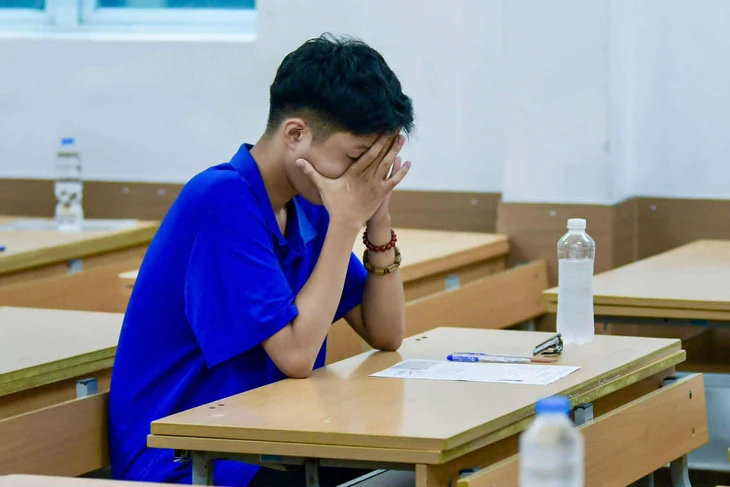
Many students enjoy a happy summer vacation, but some also fall into crisis - Illustration: DUONG LIEU
Running away from home is no longer rare, sounding the alarm about adolescent mental health - something that is being overlooked in many families.
When "I can't take it anymore"
T. (14 years old) was taken to a psychological clinic by her aunt in a quiet state, almost not wanting to talk to anyone. Before that, T. suddenly left home, turned off her phone completely and stayed at her best friend's house for three days. Her family was panicked because they thought she was missing.
When asked, T. just bowed her head and cried. During the first therapy session, T. choked up:
"I don't want to leave home, but I can't stand it anymore. There's no one at home to talk to. My parents are divorced, and my mom calls me every day just to ask if I've finished my studies or submitted my application... She works far away for a month and only comes back, and my dad is abroad and doesn't care..."
After the first mock exam did not go as expected, I wanted to go out with my friends for a few days at the end of the year but was severely scolded by my mother: "If you don't pass the exam, stay home and work for hire!"
Not daring to confide in anyone, and having no emotional support, T. fell into the feeling of "living without anyone seeing".
And I left, not to run away, but as a way to find out "if I disappeared, would anyone really care?".
Recently, a series of cases of children running away from home has made many parents worried.
There are cases where children run away from home because they get bad grades and are afraid of being scolded by their parents; there are cases where parents pay too much attention to them, making them feel like they have lost their freedom, so they run away from home... Many children run away from home without leaving a message, cutting off all contact... as a way to find a "peaceful" place where they will no longer be judged.
Sharing with Tuoi Tre, Ms. Huyen, now 30 years old, confided that when she was in high school, she also had the intention of running away from home.
"Perhaps at that age, the best solution a child can think of is to leave behind things that make them sad, constrained, and unsympathetic. And at that time, I was the same. I felt unwelcome in my own home when I was often scolded by my parents, even wrongly blamed for mistakes that were not my fault.
When I grew up, I still remember those thoughts. I don't think that those are "childish" thoughts, because I have experienced such negative emotions" - Ms. Huyen said and believes that those experiences will help her share and care for her children.

Candidates are stressed during the high school graduation exam - Illustration photo: NAM TRAN
Rebellion or despair?
According to Master Hoang Quoc Lan - clinical psychologist at Phuong Dong General Hospital, the behavior of running away from home among teenagers, especially after exams, is not simply impulsive.
"Behind that is often a long process of pressure from studying, loneliness, being compared or lack of understanding from family," said Master Lan.
Many young people after the exam shared their feelings of guilt and disappointment for "making their parents sad", and then secretly wanted to leave home as a weak reaction. Some even saw leaving as an act of self-affirmation - an idea that has been influenced many times by social media content.
"Leaving home is their way of speaking up, a silent cry for help when they feel disconnected from their loved ones," said expert Lan.
Associate Professor Tran Thanh Nam, head of the Department of Educational Sciences at the University of Education (Hanoi National University), said that parents' perspectives may not be complete, so the safest measure is to take their children for a comprehensive psychological and mental health check-up.
Parents need to recognize early signs of emotional disturbances such as children having disturbed eating and sleeping patterns, being unable to control their energy levels; not wanting to socialize with friends they used to play with; not wanting to talk to their parents even though they used to be talkative.
Even children have changed some habits, other interests or sports that were once a passion are no longer...
Especially in adolescence, it is extremely sensitive because of the influence of hormonal changes.
Experts analyze the behavior of children running away from home not just after a mother scolds them, but it is a long-standing problem. "There are many families where parents bring their children to the hospital, but the children are sick because of the parents, and the parents are at fault, but they do not realize it," Mr. Nam said, and recommended that the family be examined.
In addition, parents also need to be advised on parental behavior appropriate to their child's psychological development as well as understanding the difficulties of their child's age group in order to have appropriate ways of behaving.
How to accompany children?
According to Master Lan, parents often unconsciously become pressurers when they only care about scores and expectations, forgetting their children's basic needs of being understood and accompanied.
After the exam, what your child needs is not questions, but a hug and a simple sentence: "No matter what your score is, your parents are still here for you" or "You tried your best, now take a rest". Sometimes just a small piece of paper with the words "Mom is always here if you want to share" is enough to pull your child out of the dark.
If you see your child is isolating himself from his family, or saying negative things like "no one wants me" or "go away", parents need to pay special attention. These could be early signs of a psychological crisis.
Instead of scolding, gently say: "We know it's not easy to say, but anytime you want, we're always ready to listen."
Parents' mental and emotional presence is the most valuable "tonic" for children during sensitive periods such as grade transitions and graduation exams.
Every hug, word of encouragement, and sympathetic look can be the rope that pulls your child out of negative thoughts, before they become actions.
"Children don't need perfect parents. They need supportive parents," this expert advised.
Source: https://tuoitre.vn/giai-toa-tam-ly-sau-mua-thi-20250630230234258.htm



![[Photo] Hanoi morning of October 1: Prolonged flooding, people wade to work](https://vphoto.vietnam.vn/thumb/1200x675/vietnam/resource/IMAGE/2025/10/1/189be28938e3493fa26b2938efa2059e)


































![[Photo] President Luong Cuong receives President of the Cuban National Assembly Esteban Lazo Hernandez](https://vphoto.vietnam.vn/thumb/1200x675/vietnam/resource/IMAGE/2025/9/30/4d38932911c24f6ea1936252bd5427fa)
![[Photo] The 1st Congress of Phu Tho Provincial Party Committee, term 2025-2030](https://vphoto.vietnam.vn/thumb/1200x675/vietnam/resource/IMAGE/2025/9/30/1507da06216649bba8a1ce6251816820)
![[Photo] Panorama of the cable-stayed bridge, the final bottleneck of the Ben Luc-Long Thanh expressway](https://vphoto.vietnam.vn/thumb/1200x675/vietnam/resource/IMAGE/2025/9/30/391fdf21025541d6b2f092e49a17243f)







































![[Megastory] A term of creation: An Giang rises from historical imprints](https://vphoto.vietnam.vn/thumb/402x226/vietnam/resource/IMAGE/2025/10/1/2660ab96e53f4270bcc37f8d39c36c78)


















Comment (0)